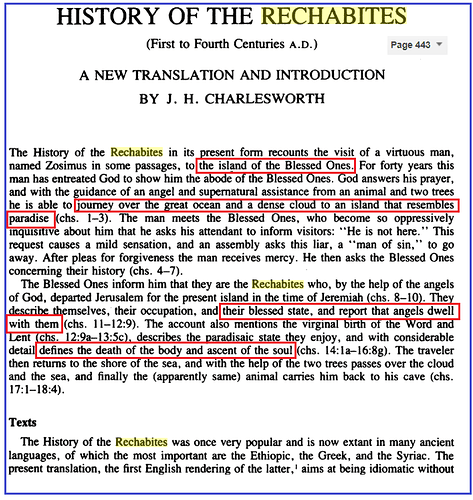Well, that’s sure as heck old enough to have inklings of expectation of bodily resurrection pre-exile…
Well, surely the whole region had plenty of thoughts about an afterlife … if only from the extensive exposure to Egyptian religious ideas.
We have the King of Judah using Egyptian symbology touching on life after to death for sure. But the first serious indication of it is not in the Old Testament… it is in the Enochian literature.
So why the big delay? Could it be that the Babylonian influence was too strong? As far as I know, there is no general resurrection in Sumerian or Babylonian theology. I am eager to be corrected if someone has something on that.
Even as late as the rise of Islam in the 600’s CE, Muhammed complains that some Arab tribes (already heavily exposed to the mystic forms of rabbinic Judaism and Christianity) totally dismiss the idea of an afterlife.
The 500’s BCE, however, is when the powerful and compelling theology of Zoroastrianism is broadly communicated throughout the Persian empire… which for a time even extends into Egypt proper!
What I see here is the strong grip of a small group of Jewish priests … suppressing the idea of a general resurrection … until popular Judaism reaches a point in its development where even the Priestly class cannot control the popular views… which have clearly absorbed a fresh wave of mysticism from the East …
From your source:
Pretty sure that’s earlier than the Book of Enoch…or are you referring to different literature than the Book of Enoch?
Yes, Job as proposed would come before Enoch. And I can see that I failed to more precisely detail the scenario that I think applies to the mysterious aspects of the Old Testament.
Job doesn’t show any specifically Enochian details. And in general is not really resplendent with any details about a general resurrection. What it does have are hints of a resurrection that are quite plausibly inspired by Jewish contact with the Persians and their Zoroastrian theology and metaphysics.
Let’s look at Ezekiel 37 - - the vision is about a bare-boned skeleton coming back to life. What’s interesting about this is that it appears to mirror the Persian practice of allowing birds and beasts to strip the flesh off of the bones of the deceased… the practice known as “Excarnation”.
The peculiar nature of the Ezekiel vision is that it does seem quite unlikely that it would have been
inspired by Egyptian metaphysics… while being quite a good match for what Zoroastrians could well
have inspired:
Eze 37:3-8
And he said unto me, Son of man, can these bones live? And I answered, O Lord GOD, thou knowest.
Again he said unto me, Prophesy upon these bones, and say unto them, O ye dry bones, hear the word of the LORD. Thus saith the Lord GOD unto these bones; Behold, I will cause breath to enter into you, and ye shall live:
And I will lay sinews upon you, and will bring up flesh upon you, and cover you with skin, and put breath in you, and ye shall live; and ye shall know that I am the LORD. So I prophesied as I was commanded: and as I prophesied, there was a noise, and behold a shaking, and the bones came together, bone to his bone. And when I beheld, lo, the sinews and the flesh came up upon them, and the skin covered them above: but there was no breath in them.
I actually have discovered other references to heaven in the OT as it happens:
He hath redeemed my soul from going into the pit, And my life shall behold the light. (Job 33:28)
I think we’ve established that Job could have been written during the time when Persian Zoroastrians were emphasizing that “the sky” was where the saintly and good went.
But even with that, the ancients were not shy about the value of the Sun sinking down into the West. Now the Sun was lighting up the underworld - - or at least that part of the Underworld where the worthiest men went to spend eternity!
I’d be careful there, the Ancients largely distinguished daylight from sunlight, the sun absolutely did not light up the whole world. This is why daylight is created before the sun in Genesis 1.
Nergal is a notorious “solar” god… but of the underworld.
Where did you get this rather “religious sounding” sentence: “the sun absolutely did not light up the whole world”?
The “world” was the part mortals were in.
The underworld was where the dead were, or the immortals.
I don’t believe I’ve ever read the use of the word “world” as to mean, by default, the Under-World as well.
Sounds like heaven to me.
This is exactly my point… it is easy for moderns to read ancient texts about the afterlife, and just assume that it meant heaven.
Here’s a line or two of text about Nergal… which originally referred to the Mortal’s view of the sun… and over time got extended into Nergal’s role in the underworld as well!
“Nergal seems to be in part a solar deity, sometimes identified with Shamash, but only representative of a certain phase of the sun. Portrayed in hymns and myths as a god of war and pestilence, Nergal seems to represent the sun of noontime and of the summer solstice that brings destruction, high summer being the dead season in the Mesopotamian annual cycle. He has also been called “the king of sunset”.[5] Over time Nergal developed from a war god to a god of the underworld.[fn6: Munnich, Maciej M. (2013). The God Resheph in the Ancient Near East. Tubingen, Germany: Mohr Siebeck. pp. 62–63.]”
“In the mythology, this occurred when Enlil and Ninlil gave him the underworld.”
How about that for the “fusion” of the mortal perception of the Sun… and the underworld lit up by the same sun!
This is an interesting verse in the Bible which concerns how the earlier Israelites apparently saw the afterlife.
From the ends of the earth I call to you, I call as my heart grows faint; lead me to the rock that is higher than I. Ps 61.2
I am reminded of the Epic of Gilgamesh, where Urshanabi sails Gilgamesh across the river of death at the end of the world. It sounds to me like they thought the underworld was at the ends of the surface of the earth.
Various ethnic groups interpreted those sentiments in various ways.
Behold… The Rechabites!
[The Suda connected the Rechabites to the mythological beginnings of the Essenes.]
^^^^^^^^^^^^^^^^^^^^^^^^^^^^^^^^^^^^^^^^^^^^^^^^^^^^^^^^^^^^^^^^^^^^^^^^^^^^^^^^^
.
.
This early Christian traveler had to go to the ends of the Earth to find the Paradise of
the Rechabites, waiting for the End of Days. This writing appears to have a Jewish literary core,
with a Christianized beginning and ending appended.
.
Google Books Link to: History of the Rechabites by Charlesworth
This topic was automatically closed 6 days after the last reply. New replies are no longer allowed.

